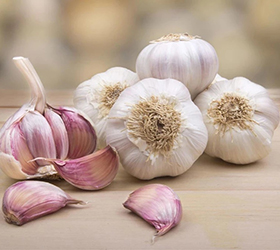
It might be time to add some more garlic to your meals.
While there are many studies showing the benefits of garlic (Allium sativum) from everything from infections to athletic performance recently studies have shown raw garlic has protective effects on chronic illness like cardio vascular disease, cancer and the aging process.
Raw garlic is also thought to be better than for cooked (processed or heated) garlic: heat seems to react with certain substances in garlic and change their chemical composition. Used universally for flavoring and in traditional medicines and functional foods to enhance physical and mental health, garlic is among the most popular condiments worldwide. Garlic contains organosulfur compounds (OSCs), which largely account for its protective effects and antioxidant properties.
It has been suggested that garlic can prevent cardiovascular disease, cancer, and diseases associated with aging. Studies have documented the protective effects of garlic consumption in gastric, colorectal, prostate, head and neck, and lung cancers. In one study raw garlic consumption of 2 times or more per week was inversely associated with a 44% reduction in lung cancer. That is, the more they had the greater the protection. The biggest impact was seen in smokers.
Evidence from randomized controlled trials have also shown that garlic is beneficial in treating hypertension and has become one of the most popular complementary therapies for blood pressure (BP) control. In a meta analysis involving seven placebo-controlled trials garlic lowered systolic BP by around 6.71 mmHg and diastolic BP by 4.79 mmHg showing that garlic is an effective and safe approach for hypertension. Other studies have shown that it not lonely lowers cholesterol but helps clear the calcium from the arteries and lowers inflammation. The real risk factors for heart attacks and strokes.
Garlic also help with lowering all types of mortality and even extending lives. In one study participants who consumed raw garlic 5 times or more a week or occasionally, 1–4 times/week, survived longer than those who rarely (less than once/week) consumed it. In this study, habitual consumption of garlic was associated with a lower all-cause mortality risk.
It appears that the only thing garlic does not help with is the first date!!!!